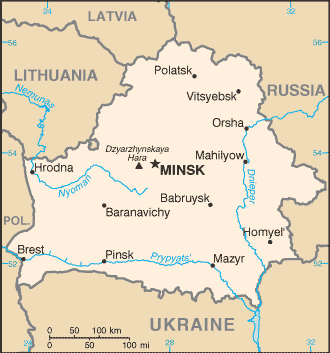Heineken acquires Syabar Brewing Company in Belarus
Located between Poland and Russia, Belarus may not be the paragon of democracy, yet its beer market has shown significant growth potential.
On 28 December 2007 Heineken announced that it has acquired the Cypriot holding company of the Syabar Brewing Company, in Babruysk, Belarus.
Cypriot money in Belarus? Before readers get things wrong, there is the little known-fact that Cyprus acts as the biggest official “investor” in Russia (and probably Belarus too), due to the amount of Russian capital which is saved there.
Under the terms of the transaction, Heineken will acquire Syabar’s Cypriot parent company from a consortium led by Detroit Investments Limited (Cyprus) and from the International Finance Corporation, an affiliate of the World Bank.
Heineken would not disclose the acquisition price. However, analysts quoted by the British media claim that the price is somewhere between EUR 70 million and EUR 130 million. Heineken says that the transaction will be funded from existing cash resources and will be earnings enhancing in 2008 and value enhancing in 2012.
| After seven decades as a constituent republic of the USSR, Belarus attained its independence in 1991. Since his election in July 1994 as the country’s first president, Alexandr Lukashenko has steadily consolidated his power through authoritarian means. Government restrictions on freedom of speech and the press, peaceful assembly, and religion continue. map: CIA |
The Syabar Brewing Company has been operational since October 2005 following the reconstruction of a state owned brewery. It employs 280 staff and is located in Bobruysk, 140 km south-east of the capital Minsk. The portfolio consists of the national mainstream beer brand Bobrov, which holds the number two position in the market and the recently introduced premium brand Syabar, Heineken says
In 2007 Heineken estimates that the sales volume will have reached 600,000 hl beer, compared to 370,000 hl in 2006. Technical production capacity is 1.1 million hl with the possibility to expand to 2.1 million hl beer.
Nico Nusmeier, Regional President Central and Eastern Europe, Heineken N.V., commented: "Belarus is a fast growing market and this deal will give us an excellent platform from which to grow both the Heineken brand as well as our imported Russian brands."
The Belarus beer market is showing double-digit growth. Although vodka is still the tipple of choice, annual consumption has risen to almost 4.5 million hl beer. With 10 million inhabitants, average beer consumption stands at 45 litres. Belarus has 13 brewing companies and five mini-breweries according to figures published by the Belarus Embassy in Germany.
Because of its close ideological ties to Russia, Belarus consumers have always had a penchant for Russian beer brands, which may explain why Baltika tried to enter this market as early as 2001.
Yet, Belarus is a market not for the timid. Readers will remember that in November 2001 Baltic Beverages Holding (BBH) announced that its subsidiary, Baltika, had entered into an agreement with the Minsk-based Krinitsa brewery, which was then the country’s largest brewer at 700,000 hl beer annually.
According to media reports, Baltika invested USD 10.7 million in the modernisation of the brewery, hoping to acquire a controlling stake for about USD 50 million. The government, however, froze the deal in December 2001, but it was not until late May 2003 that it notified Baltika of the contract termination.
Baltika tried to get its money back, which it did after an arbitration court ruling in 2005. Despite this negative experience, Baltika has kept on repeating its readiness to pursue large investment projects in Belarus, signalling that the company looks beyond past disagreements with the Belarusian authorities.
Even without local production, Belarus is an important export market for Baltika. Dmitry Kistev, the Russian company’s export director, told reporters in Minsk on 26 November last year that Baltika holds a 10 percent share in the Belarusian beer market. The company’s sales in the country account for 20 percent of Baltika’s exports, third only to Kazakhstan and Ukraine.
To continue with our history lesson, BBH tried a new approach after Baltika’s failed purchase. In December 2006, BBH secured a foothold in the Belarus market through acquiring a stake in the Minsk-based Olivaria Brewery. Olivaria has a market share of approximately 10 percent, a brewing capacity of 600,000 hl beer and 600 employees (2006). Olivaria is one of the most recognised brands in Belarus.
The European Bank for Reconstruction and Development (EBRD) has been a major shareholder in Olivaria since 2005, which may be the reason why BBH was invited in in the first place.


